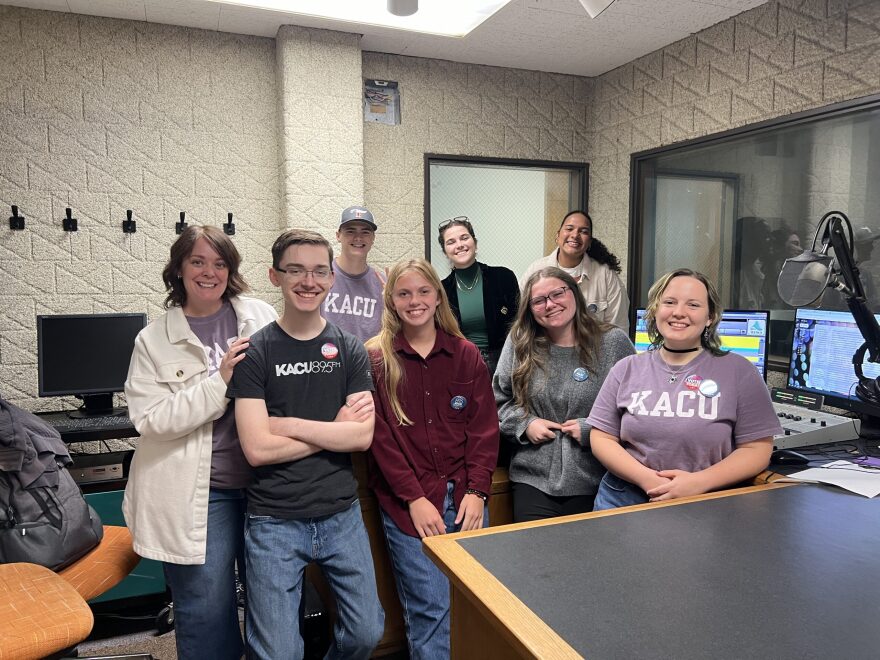Last Friday, Congress passed a bill that takes back $1.1 billion in funding that was allocated to public media for 2026 and 2027.
Public radio listeners have likely heard the news, and Texas Standard listeners likely catch the broadcast from a local public radio station. The funding cuts will affect every station in each city differently because of how local affiliate stations and NPR work.
Abilene NPR member station, KACU’s, News Director and General Manager Heather Claborn joined the Standard to talk about what the cuts could mean for smaller stations. Listen to the interview above or read the transcript below.
This transcript has been edited lightly for clarity:
Texas Standard: So the Corporation for Public Broadcasting… Let’s just sort of lay a foundation here. What is that and how does it relate to NPR?
Heather Claborn: Sure, so Congress established the CPB in 1967. It’s supposed to be an independent nonprofit that helps support public broadcasting in America.
So for the past 60 years, they’ve distributed funds directly to the CPB and then CPB sends that money out to member stations. It sends it a little bit, maybe I think 10% of their overall budget goes directly to NPR, but really the bulk comes to stations like the 24-plus stations in Texas.
Yes, so KACU gets a certain amount of money from the Corporation for Public Broadcasting, correct?
We get 31% of our budget from the Corporation for Public Broadcasting.
Now let’s talk about the relationship of your station, KACU, and NPR in Washington. What’s that?
So, like all the stations across America that are public broadcasters, we are autonomous. We have the ability to pick and choose what serves our local community.
We have a mix of shows that we think are particularly interesting to our listeners out here in West Central Texas. We do a little bit of local programming, but we can also buy from other distributors such as American Public Media or the Public Radio Exchange.
We’re independent, but we’re a member station that works in coordination to serve our community.
So if you lose this 30% of your budget, you lose the ability not just to, well, to continue to operate more broadly, but what you’re talking about is you’re gonna have to have some kind of programming to fill the schedule in those areas that you might not be able to pay for otherwise. Is that the idea?
So we’ve been working on fighting against this rescission for the past six months, but we’ve also been making backup plans over those six months. And we don’t have a huge budget. A lot of stations were able to jump into fundraising to try to fill that hole immediately, but we have a staff total of five people and we just don’t have the resources to immediately launch a fundraising campaign.
We’re going to do some saving. We’re gonna do some efforts to raise those funds. We are negotiating discounts with our distributors.
I mean, we’re putting all kinds of plans in place but we really have to rely on the community to step forward and help at a higher level than they have in the past if we’re going to be able to continue the level of service that we have provided over the last almost 40 years here in Abilene.
You have a lot of listeners there in Abilene. I mean, what’s your fundraising base like?
That’s a great question. About three years ago, Nielsen stopped doing surveys. So we don’t have firm numbers of what our listenership is. I think we estimate maybe 10-plus thousand per week. But yeah, we’re not really sure.

Of course, whatever that number is, you compare it to a city like say Dallas or San Antonio, you have a much bigger base of potential listeners. So whereas in some of these bigger cities, there will be an impact, it might not be as great as what you’ll feel in Abilene no matter what that listener number is.
We were identified – NPR let us know that we are one of the most vulnerable stations.
Several stations across the country get more than 10%, more than 30%, some as much as 50% of their budget from the Corporation for Public Broadcasting, and 30% is really significant.
We do have a core of listeners that really rely on us for their news and information. And honestly, we’re a region that is kind of on the verge of turning into a news desert.
The newspaper locally used to be 250 people strong. It’s down to less than five. The local television stations have two stations sharing one newsroom, and the other affiliate recently cut its staff significantly and went to an anchorless newscast situation that they’re piloting for their network.
It’s just a really tenuous time for locals in Abilene to have sources of local news.
This is one of the fastest-growing cities in Texas. I know we were just up there visiting the station a few months ago.
There’s an awful lot going on here. There’s a lot of growth. There’s lot of technology growth.
But yeah, if we don’t have the funding, it’s gonna really hamper our ability to dig into these stories.
If you found the reporting above valuable, please consider making a donation to support it here. Your gift helps pay for everything you find on texasstandard.org and KACU.org. Thanks for donating today.


